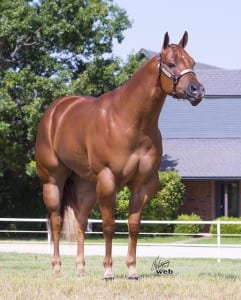The majority of people now shop and buy frequently online. From items as small as a hoof pick to as large as a luxury motor home, the horse industry has joined the Internet marketing world.
In 2009 when Mike and Stephanie Jennings first started floating the idea of Internet horse auctions, many of their customers were not sure they could buy a horse without seeing, touching or riding it. Veterans in the world of professional horse sales, the couple was convinced that it could work, based on their knowledge of the industry from helping customers sell and buy more than 60,000 horses since 1979. During that time they managed over 300 live horse auctions including the AQHA World Championship Show Sale, the NRCHA Snaffle Bit Futurity Sale and they continue to manage the All American Quarter Horse Congress Super Sale.
As more and more sellers opted to market their horses on the Internet, primarily through online classified advertising sites, buyers adjusted their approach to shopping. In addition to Internet classified websites, there are now Facebook pages that list horses of as many breeds and disciplines as can be imagined. Internet horse auctions have entered the picture, and the Jennings have become industry leaders in Internet Horse Auctions for the Quarter Horse, Paint and Appaloosa markets as well as for performance horses. Their Internet auction format has sold over 1,500 horses for more that $6,000,000 since 2012.
Their advice on buying and selling online is golden and their tips can lead to a better on-line experience.
Identify Your Target Market & Find Marketing Sites that reach that Market
When a horse is offered for sale on the Internet, it can potentially be exposed to a large number of people, Worldwide. There are many places to list a horse for sale, so a seller should define the target market for the horse and use the websites, social media pages or auctions that reach that specific market. Of course you wouldn’t list a reining horse on a site that advertises halter horses! However, sites for related markets should be considered – a reining horse could be listed on a site selling ranch event horses, reined cow horses, or even cowboy mounted shooting horses!
 Going to general horses for sale sites, or YouTube, can provide additional exposure and possibly reach that new customer who is not reached through a tightly targeted marketing site. The more places your horse is listed, the more chances it has to show up in search engines where buyers are shopping.
Going to general horses for sale sites, or YouTube, can provide additional exposure and possibly reach that new customer who is not reached through a tightly targeted marketing site. The more places your horse is listed, the more chances it has to show up in search engines where buyers are shopping.
While it is nice to sell a horse with no cost by using free sites, you sometimes get what you pay for. Classified web sites that charge a fee can afford to do more advertising and make improvements to their site for added convenience to sellers and buyers. Auction companies charge fees, and offer more assistance to customers than classified listing sites.
Professional Horse Services, LLC, owned by the Jennings, invests a significant amount of money for auction advertising which drives customers to their website and to the Internet Horse Auction catalog. They advertise in digital magazines, plus their email list consists of more than 20,000 customers who have bought or sold with them. It also includes people who have requested information about their auctions. In addition to marketing to their own list, they also send email blasts using other mailing lists, which total nearly 500,000 email addresses and include addresses to both targeted and general markets. With 38 years’ experience, they can work one-on-one with sellers or buyers to help them achieve the most success.
Advertise with good quality pictures and videos

A seller’s primary job is to attract a buyer to his or her horse and convince the buyer to pay a good price for it. How the horse is presented makes a huge difference in the type of buyer it will attract. A show horse or prospect should be presented as a horse show, which is more appealing than going out and snapping a few photos in the pasture or taking a video of a training session. Since most buyers do not travel to see a horse, sellers should try to show the buyer everything they would see at the farm or ranch through the videos, photos and the description provided.
Use an attractive picture that will stop the shopper and get his or her attention. Do not bore the customer. It is your job to keep the buyer interested and watching. This is the digital age – people want things fast.
A video should open with the most exciting maneuver the horse does well. Show all the horse’s skills briefly. Don’t start the video with 3 minutes of trotting or your customer will move on to something else after a few seconds and never see the great spins, lead changes, or stops that are included at the end! Those who do this well will enjoy the most success.
Pricing is important

Study the market that fits your horse to see how similar horses are priced, and when possible find out an actual selling price. A horse that is priced too high will linger on the market for a long time, even if the seller makes a great presentation. Auctions help sellers find the market value for their horse. The bidding process is a price negotiation. A face-to-face price negotiation makes some people uncomfortable. An auction takes away that pressure.
In the Internet auction, the seller can set a minimum, or reserve price for a horse and it will not be sold for less than that amount. Others are more motivated to sell and want to see what the public will offer before they decide if they will sell. If an acceptable price is not met during the bidding process, there are times when Pro Horse Services has been able to negotiate an acceptable price after the auction between a seller and a bidder. In auctions some horses will bring more than the asking price when excited buyers compete for a horse that has been presented well.
Buyers are able to do a more thorough job of shopping for horses on the Internet and through auctions than they realize. A number of horses can be found for most purposes just by searching. Buying a horse is often an emotional decision – there is something about THAT horse that connects with the buyer. However, a buyer should also be objective about the things he wants or needs in a horse. If a horse is too far away to see in person, a buyer has to rely on the information provided by the seller.
Identify what you are looking for
 Make a list of the things that you need or want in your new horse. This keeps the emotional side from completely taking over. For most horses this list should include basic items such as general disposition, hauling, clipping, shoeing, health history, including previous lameness, illness or surgery, and vices like cribbing or weaving. For performance horses it may include the level of rider that is required to ride or show the horse, or what it takes to prepare the horse to show. A list should also include issues the buyer doesn’t want, like a cribber or a horse that requires maintenance for soundness issues.
Make a list of the things that you need or want in your new horse. This keeps the emotional side from completely taking over. For most horses this list should include basic items such as general disposition, hauling, clipping, shoeing, health history, including previous lameness, illness or surgery, and vices like cribbing or weaving. For performance horses it may include the level of rider that is required to ride or show the horse, or what it takes to prepare the horse to show. A list should also include issues the buyer doesn’t want, like a cribber or a horse that requires maintenance for soundness issues.
Try to determine in advance if any of these needs or wants are negotiable. Could you live with a cribber, for example, if the horse was perfect in every other aspect, and if the price was right?
Get the answers to all of your questions before making a decision.
Look carefully at the information provided by the seller. Contact the Seller to get the answers to all of your questions. You can ask for additional photos or videos, if needed. A motivated seller should respond with the information requested and provide direct answers. If there is no response or the seller evades questions it may be time to look at other horses.
A buyer should be able to have a veterinarian examine the horse; or have a professional or knowledgeable horse person look at the horse. If the horse is in an auction, read the auction’s terms and conditions to see what examinations are allowed before and after bidding. In most cases inspections and pre-purchase exams can be done prior to the bidding, but a post-purchase exam may be limited. In an auction, the buyer should allow enough time to thoroughly shop the horse before the bidding closes.
There is a certain amount of risk involved with buying any horse. However, the buyer that does a thorough job of shopping can reduce the risk and successfully buy a horse over the Internet. For example, horses sold through the Professional Horse Services Internet Horse auctions have won a number of World and National Championships for their new owners.
About the Authors: Mike and Stephanie Jennings own Professional Horse Services, LLC and are based in Round Hill, Virginia. They are the industry leaders in Internet Horse Auctions for the Quarter Horse, Paint and Appaloosa markets as well as for performance horses. They have managed over 300 live horse auctions including the AQHA World Championship Show Sale, the NRCHA Snaffle Bit Futurity Sale and continue to manage the All American Quarter Horse Congress Super Sale.








